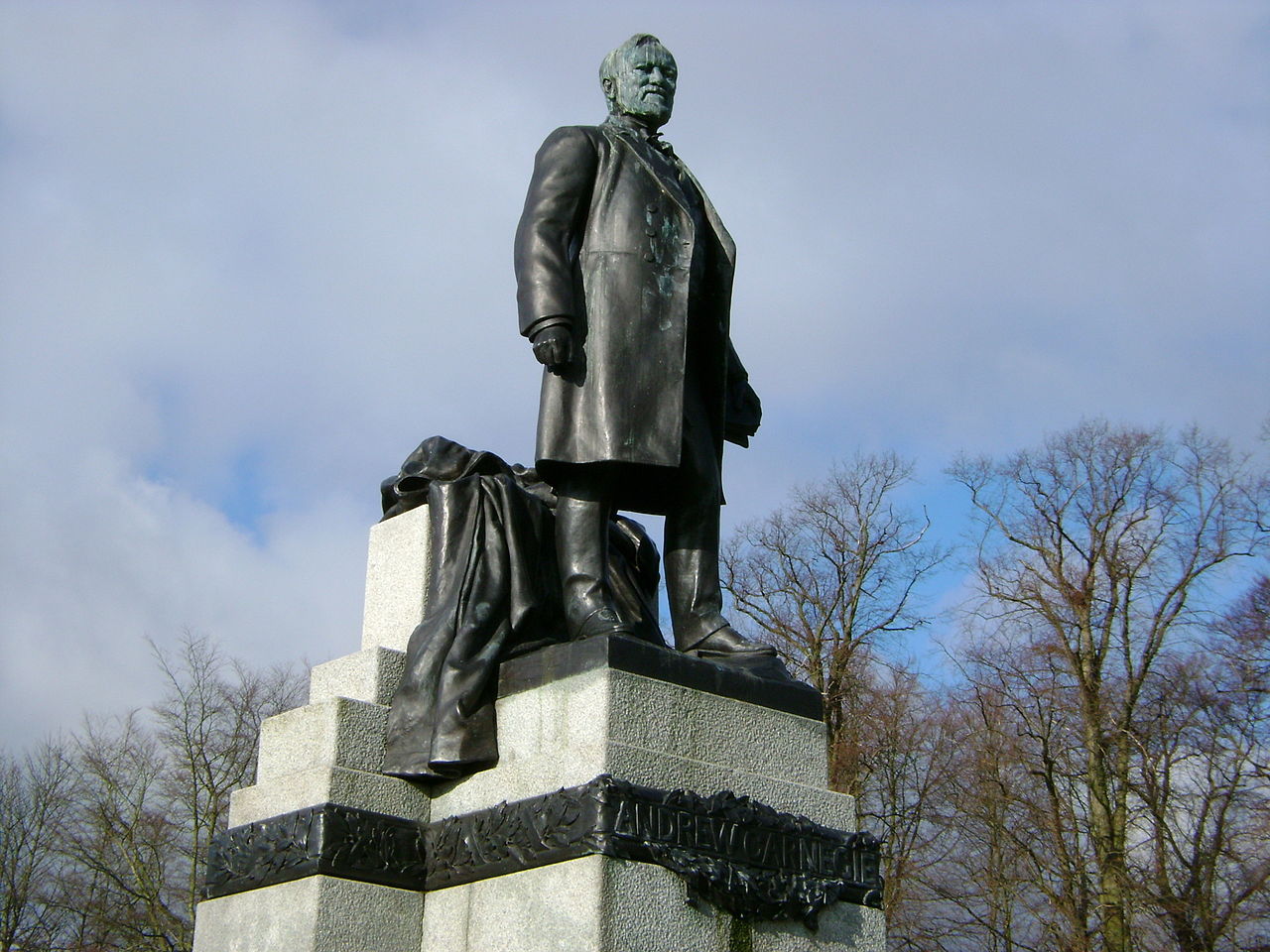 |
| The Statue of Andrew Carnegie in his home town of Dunfermline |
Andrew Carnegie was born in Dunfermline, Scotland in 1835. Influenced by his "favorite living hero in public life", the British liberal, John Bright, Carnegie started his efforts in pursuit of world peace at a young age. His motto, "All is well since all grows better", served not only as a good rationalization of his successful business career but also in his view of international relations.
Despite his efforts towards international peace, Carnegie faced many dilemmas on his quest. These dilemmas are often regarded as conflicts between his view on international relations and his other loyalties. Throughout the 1880s and 1890s, for example, Carnegie allowed his steel works to fill large orders of armor plate for the building of an enlarged and modernized United States Navy; while he opposed American oversea expansion.
On the matter of American colonial expansion, Carnegie had always thought it is an unwise gesture for the United States. He did not oppose the annexation of the Hawaiian islands or Puerto Rico, but he opposed the annexation of the Philippines. Carnegie believed that it involved a denial of the fundamental democratic principle, and he also urged William McKinley to withdraw American troops and allow the Filipinos to live with their independence. This act well impressed the other American anti-imperialists, who soon elected him vice-president of the Anti-Imperialist League.
After he sold his steel company in 1901, Carnegie was able to get fully involved into the acts for the peace cause, both financially and personally. He gave away much of his fortunes to various peace-keeping agencies in order to keep them growing. When his friend, the British writer William T. Stead, asked him to create a new organization for the goal of a peace and arbitration society, his reply was as such:
Carnegie believed that it is the effort and will of the people, that maintains the peace in international relations. Money is just a push for the act. If world peace depended solely on financial support, it would not seem a goal, but more like an act of pity.
Like Stead he believed that the United States and the British Empire would merge into one nation, telling him "We are heading straight to the Re-United States". Carnegie believed that the combined country's power would maintain world peace and disarmament. The creation of theCarnegie Endowment for International Peace in 1910 was regarded as a milestone on the road to the ultimate goal of abolition of war. Beyond a gift of $10 million for peace promotion, Carnegie also encouraged the "scientific" investigation of the various causes of war, and the adoption of judicial methods that should eventually eliminate them. He believed that the Endowment exists to promote information on the nations' rights and responsibilities under existing international law and to encourage other conferences to codify this law.
In 1914, on the eve of the First World War, Carnegie founded the Church Peace Union (CPU), a group of leaders in religion, academia, and politics. Through the CPU, Carnegie hoped to mobilize the world's churches, religious organizations, and other spiritual and moral resources to join in promoting moral leadership to put an end to war forever. For its inaugural international event, the CPU sponsored a conference to be held on August 1, 1914, on the shores of Lake Constance in southern Germany. As the delegates made their way to the conference by train, Germany was invading Belgium.
Despite its inauspicious beginning, the CPU thrived. Today its focus is on ethics and it is known as the Carnegie Council for Ethics in International Affairs, an independent, nonpartisan, nonprofit organization, whose mission is to be the voice for ethics in international affairs.
The outbreak of the First World War was clearly a shock to Carnegie and his optimistic view on world peace. Although his promotion of anti-imperialism and world peace had all failed, and the Carnegie Endowment had not fulfilled his expectations, his beliefs and ideas on international relations had helped build the foundation of the League of Nations after his death, which took world peace to another level. (wiki)




